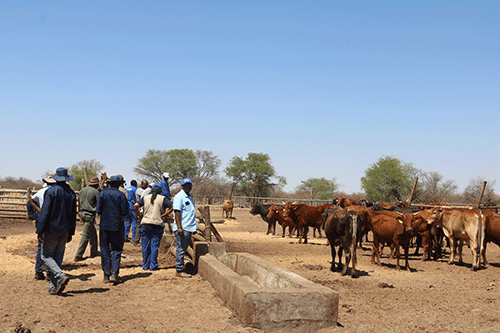Elizabeth Hiyolwa
MANGETTI – The Kavango West regional leadership last week conducted a follow up visit to the Kavango Cattle Ranch, which was recently in the news for having fallen into disrepair.
The councillors went to assess the progress of the state-owned farm managed by Namibia’s Industrial Development Agency (NIDA).
Despite some very few burnt carcasses that were observed and an incident of an elephant chasing some employees the previous night, the leadership was pleased to observe positive progress and said the cattle look better, the water points are no longer flooded, which portrayed the hope that was dimmed on the previous visits.
The farm manager, Gerhard Mouton, who described the farm as the newborn Mangetti, said the most important incident that happened is that they recognised there was a problem that needed to be solved.
Mouton stated despite elephants still roaming around, the employees went back to the farm camps, which contributed to the progress that was observed.
“If it was not for them, there is nothing that we could do. Simply, they put their attention there. The water regime was changed; from there, we changed the kraals. We received input that was necessary: the diesel and the lick, and we are still working on our colleagues’ danger allowance,” he highlighted.
Furthermore, he commended the leadership and other stakeholders, such as Meatco, who assisted with transport and marketing.
Kavango West regional council chairperson Joseph Sivaku Sikongo said the leadership is pleased with the status quo at the farm, as it has changed.
“For us, Mangetti is just not a farm. For us, it is a mine because that is where money comes from this part of Namibia – going to central government,” stressing that, “If there is any Namibian saying there is nothing that comes from Kavango, Mangetti is our mine. We are feeding Namibians with meat – not only meat but money as well.”
He, however, urged NIDA’s leadership to allow the farm mangers on the ground to have some pretty cash at the site and avoid a procurement route for simple things such as a tyre.
Further, he urged them to pay danger allowance to the employees at the camps without delay, adding that “delaying will just move us back to square one”.
Sikongo further encouraged the leaders to be transparent with all employees to cultivate a spirit of trust among employees.
During the visit, the governor, Sirrka Ausiku, however, expressed her disappointment that “we are a bit concerned that the promise (the danger allowance) that NIDA made in front of the minister was not implemented after two months. The moment we start doing that, we will create mistrust with the employees”.
Ausiku further suggested a management committee be formed, which will comprise of the regional council, the traditional authorities and the farm, so that the management of the farm will be at the satisfaction of all stakeholders.


